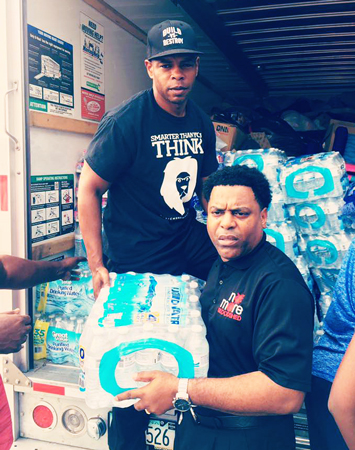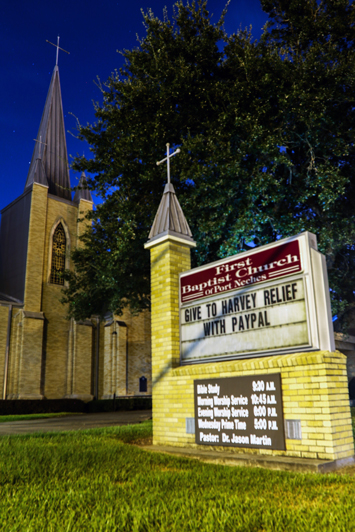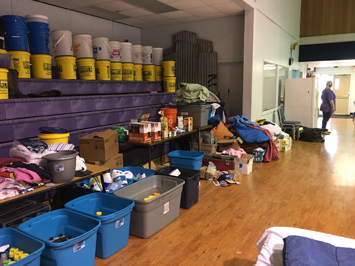Houses of worship and relief in times of trouble
By J.A. Salaam -Staff Writer- | Last updated: Dec 14, 2017 - 3:02:48 PMWhat's your opinion on this article?

Deric Muhammad (left), a Muslim community activist and Pastor E.A. Deckard (right) of Greenhouse International Church have teamed up in relief efforts. Photo: Deric Muhammad/Facebook
|
Reactions varied, including anger and disappointment, and critics questioned the role and responsibility of places of worship regarding congregants and surrounding communities during times of trauma and disasters. Several places of worship have taken the lead in the aftermath of weather-related disasters to be places of shelter, sanctuary and safety.
“I believe the church should always be on the front line during times of natural disasters. As a matter of fact, I believe the church should always be visible and active whenever there are needs in the community. The Bible says we should love our neighbors, therefore serving our neighbors should be our act of ministry during times of disaster,” said Pastor E.A. Deckard of Greenhouse International Church, located in Houston.
Pastor Deckard and his congregation have worked diligently in relief efforts not only for survivors of Hurricane Harvey but in prior flooding events that have plagued the city. His church has joined efforts with local activist Deric Muhammad, who is a Muslim, and with members of Muhammad Mosque No. 45 of the Nation of Islam.
Working across religious lines to assist those in need is important, say activists.

Since Hurricane Harvey carved it’s destructive path through Texas, several Texas National Guards units were given room and board at the church in Port Neches during their efforts to get essential supplies to storm victims. Photo: U.S. Army National Guard Photo/Sgt. 1st Class Whitney Houston
|
“When Hurricane Harvey hit Houston, as a pastor I knew we had to open our church doors 24/7 and serve our neighbors until there were no more needs left. I also believe during times of natural disaster all houses, and people of faith, should come together in unity and serve the community in love,” declared Pastor Deckard.
Pastor Jamail Johnson of The Word Church of Houston, Texas, agrees. “I believe the church has a responsibility to the communities they reside in, period. Natural disaster or not, we have a continued responsibility to offer aid and assistance to our community. Granted our efforts should increase during catastrophic times, but they shouldn’t just be starting,” he told The Final Call.
“See, I believe it’s an indictment on anybody of belief, any religion you profess, to have a street address in a neighborhood and neglect addressing the issues of the neighborhood. If we remain in place, we very well can help our people deal with their storms before a hurricane comes,” said Pastor Johnson.
Historically the church played a significant role in the Black community as a place of refuge in times of trouble. Before the Civil War, “freed” slaves belonged to bi-racial congregations controlled by Whites, many of which required Black members to sit in the back of the church during services. With emancipation, Blacks withdrew from those institutions to create their own churches. They pooled their resources to purchase land and erect church buildings. During the civil rights movement, the Black church was pivotal for planning, meeting, strategizing and mobilizing. It was a place of spirituality and practicality. Today, religious institutions can have a similar effect especially when struggle and disaster arise.
“The role of houses of worship is to minister to the whole man, psychologically, emotionally, spiritually, physically and economically to handle the traumatic effects of the disasters during and after,” said Student Minister Dr. Abdul Haleem Muhammad, Southwest Regional Representative of the Nation of Islam and the Honorable Minister Louis Farrakhan.
“We must encourage the congregation to provide food, clothing, shelter, transportation and finances to those in need. We must become advocates on behalf of the least of us. And we must push the authorities to help the people and plea to Allah to have mercy on His elect as they suffer through these trying times,” he said.

Members from the Nebraska Air National Guard 155th Medical Group deployed to provide Hurricane Harvey relief in Texas September 2-9 in Lincoln, Nebraska. Forty-four Medical Group personnel deployed to Texas to provide assistance and relief medical triage capabilities as a CBRNE (Chemical, Biological, Radiological, Nuclear, and high-yield Explosives) CERFP (Enhanced Response Force Package). The Nebraska National Guard thanked the First Baptist Church of Port Neches for their gracious hospitality during their deployment to Hurricane Harvey Relief. The church provided housing, showers and extra bathrooms, laundry service, and fed the Nebraska military and some of the Texas National Guard deployed in the area, as well as provided for area residents in many ways. Photo: U.S. Air Force Photo/Technical Sgt R. Denise Mommens
|
“It’s our duty to help those in trouble. Many churches don’t have defined responsibility during natural disasters, except they are partners in N.V.O.A.D. (National Voluntary Organizations Active in Disasters). Not all religious houses are part of us and some have their own way of helping. This is a collaboration under the American Red Cross, in which the roles are defined to assure services are given equally,” said Pastor David Peay, director of Community Services for the Southeastern Conference of the Seventh Day Adventists.
“We have the Church of Brethren (child care), United Methodist (collect financial donations), Baptist and Mennonites (clean-up), Church of the Latter-Day Saints (personal comfort kits) and Seventh Day Adventist (staff warehousing and distribution),” he explained.
For more information, visit nvoad.org.
INSIDE STORIES AND REVIEWS
-
-
About Harriett ... and the Negro Hollywood Road Show
By Rabiah Muhammad, Guest Columnist » Full Story -
Skepticism greets Jay-Z, NFL talk of inspiring change
By Bryan 18X Crawford and Richard B. Muhammad The Final Call Newspaper @TheFinalCall » Full Story -
The painful problem of Black girls and suicide
By Charlene Muhammad -National Correspondent- » Full Story -
Exploitation of Innocence - Report: Perceptions, policies hurting Black girls
By Charlene Muhammad -National Correspondent- » Full Story -
Big Ballin: Big ideas fuel a father’s Big Baller Brand and brash business sense
By Bryan Crawford -Contributing Writer- » Full Story






 Click Here Stay Connected!
Click Here Stay Connected!








